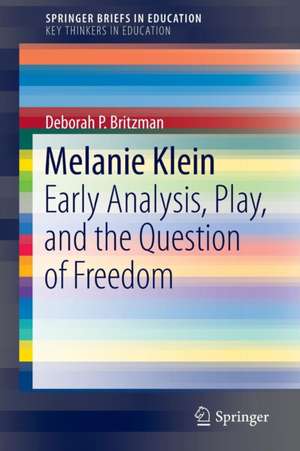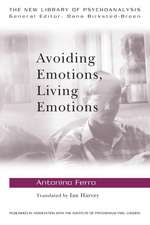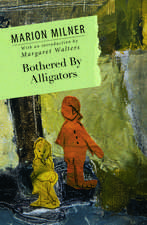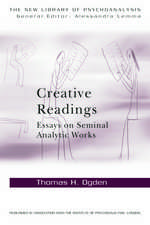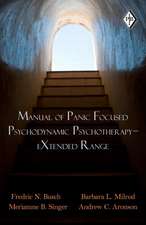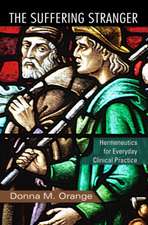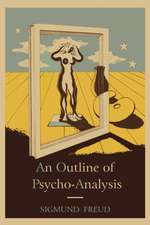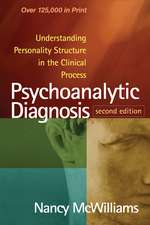Melanie Klein: Early Analysis, Play, and the Question of Freedom: SpringerBriefs in Education
Autor Deborah P. Britzmanen Limba Engleză Paperback – 16 noi 2015
Din seria SpringerBriefs in Education
-
 Preț: 317.28 lei
Preț: 317.28 lei -
 Preț: 478.71 lei
Preț: 478.71 lei - 20%
 Preț: 387.43 lei
Preț: 387.43 lei - 17%
 Preț: 392.10 lei
Preț: 392.10 lei -
 Preț: 196.30 lei
Preț: 196.30 lei -
 Preț: 394.40 lei
Preț: 394.40 lei -
 Preț: 356.31 lei
Preț: 356.31 lei -
 Preț: 444.52 lei
Preț: 444.52 lei -
 Preț: 196.15 lei
Preț: 196.15 lei -
 Preț: 262.86 lei
Preț: 262.86 lei -
 Preț: 370.60 lei
Preț: 370.60 lei -
 Preț: 376.59 lei
Preț: 376.59 lei -
 Preț: 379.68 lei
Preț: 379.68 lei -
 Preț: 408.44 lei
Preț: 408.44 lei -
 Preț: 376.22 lei
Preț: 376.22 lei -
 Preț: 378.34 lei
Preț: 378.34 lei -
 Preț: 346.59 lei
Preț: 346.59 lei -
 Preț: 377.18 lei
Preț: 377.18 lei -
 Preț: 377.35 lei
Preț: 377.35 lei -
 Preț: 476.03 lei
Preț: 476.03 lei -
 Preț: 376.43 lei
Preț: 376.43 lei -
 Preț: 379.48 lei
Preț: 379.48 lei -
 Preț: 479.29 lei
Preț: 479.29 lei -
 Preț: 340.61 lei
Preț: 340.61 lei -
 Preț: 377.18 lei
Preț: 377.18 lei -
 Preț: 377.57 lei
Preț: 377.57 lei -
 Preț: 376.59 lei
Preț: 376.59 lei -
 Preț: 377.18 lei
Preț: 377.18 lei -
 Preț: 380.84 lei
Preț: 380.84 lei -
 Preț: 379.09 lei
Preț: 379.09 lei -
 Preț: 354.09 lei
Preț: 354.09 lei -
 Preț: 377.95 lei
Preț: 377.95 lei -
 Preț: 379.68 lei
Preț: 379.68 lei -
 Preț: 377.35 lei
Preț: 377.35 lei -
 Preț: 346.59 lei
Preț: 346.59 lei -
 Preț: 444.52 lei
Preț: 444.52 lei -
 Preț: 376.22 lei
Preț: 376.22 lei -
 Preț: 381.21 lei
Preț: 381.21 lei -
 Preț: 348.13 lei
Preț: 348.13 lei -
 Preț: 409.25 lei
Preț: 409.25 lei -
 Preț: 410.17 lei
Preț: 410.17 lei -
 Preț: 377.57 lei
Preț: 377.57 lei -
 Preț: 380.63 lei
Preț: 380.63 lei -
 Preț: 376.59 lei
Preț: 376.59 lei -
 Preț: 377.57 lei
Preț: 377.57 lei -
 Preț: 380.07 lei
Preț: 380.07 lei -
 Preț: 378.54 lei
Preț: 378.54 lei -
 Preț: 379.48 lei
Preț: 379.48 lei -
 Preț: 377.73 lei
Preț: 377.73 lei -
 Preț: 342.74 lei
Preț: 342.74 lei
Preț: 377.95 lei
Nou
Puncte Express: 567
Preț estimativ în valută:
72.32€ • 75.71$ • 59.84£
72.32€ • 75.71$ • 59.84£
Carte tipărită la comandă
Livrare economică 05-19 aprilie
Preluare comenzi: 021 569.72.76
Specificații
ISBN-13: 9783319260839
ISBN-10: 3319260839
Pagini: 112
Ilustrații: VI, 112 p.
Dimensiuni: 155 x 235 x 12 mm
Greutate: 0.18 kg
Ediția:1st ed. 2016
Editura: Springer International Publishing
Colecția Springer
Seriile SpringerBriefs in Education, SpringerBriefs on Key Thinkers in Education
Locul publicării:Cham, Switzerland
ISBN-10: 3319260839
Pagini: 112
Ilustrații: VI, 112 p.
Dimensiuni: 155 x 235 x 12 mm
Greutate: 0.18 kg
Ediția:1st ed. 2016
Editura: Springer International Publishing
Colecția Springer
Seriile SpringerBriefs in Education, SpringerBriefs on Key Thinkers in Education
Locul publicării:Cham, Switzerland
Public țintă
ResearchCuprins
Affecting Psychoanalysis.-The Early Education of Psychoanalysis.- Away from Education: Step by Step.- The Psychoanalytic Situation: Early Analysis and Its Theory of Play Technique.- “Everything good and bad”: Developing The Depressive Position and Imagination.- “Six Degrees of Separation”: The Freud-Klein Controversies 1941-1945.- “If I Were You”: A Phantasy in Two Parts.- Narratives of the Psychoanalytic Situation: On The Friendship of Mrs K. and Richard.
Notă biografică
Deborah Britzman is Distinguished Research Professor at York University in Toronto and a Fellow of the Royal Society of Canada. She is author of seven books, over 80 referred articles and is known for her contribution in education and psychoanalysis. Britzman is also a psychoanalyst with a small clinical practice.
Textul de pe ultima copertă
This volume introduces the psychoanalyst Melanie Klein to the general field of education and traces her theories of mental life as an emotional situation, through to problems of self/other relations in our own time. The case is made for Klein’s relevance and the difficulties her theories pose to the activities of learning and pedagogical relation. Klein’s vocabulary—the paranoid/schizoid and depressive positions, phantasy, object relations, projective identification, anxiety, envy, and the urge for reparation and gratitude— are discussed in terms of their evolution and the designs of her main questions, all stemming from the problem of inhibition. Her contribution to an understanding of symbolization and the shift from concrete thinking to greater freedom of mind is analyzed. The essay develops the following questions: why is learning an emotional situation? How did Klein’s life and larger history influence her views? What are her central theories of mental life? Why did Klein focus on anxiety and phantasies as making up the life of the mind? What is object relations theory? And, what does Klein’s model of the self proffer to contemporary education in schools and in universities?
Caracteristici
Examines Klein’s relevance for education through her understanding of the inner world Discusses how Klein’s theory questions what we imagine as objects of learning and how we imagine learning occurs Analyzes a number of deep existential, philosophical, and relational dilemmas on the nature of teaching and learning Includes supplementary material: sn.pub/extras
